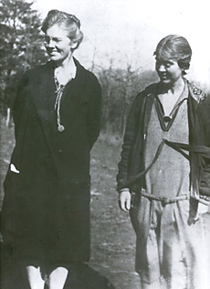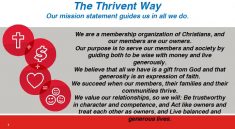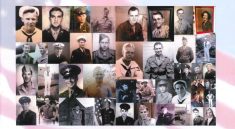John C. Campbell Folk School, Brasstown, NC, Founded by Olive Campbell and Marguerite Butler, UNC TV “Sing Behind The Plow”
From UNC TV.
“Sing Behind The Plow: John C. Campbell Folk School
Wednesday, August 15, 09:00 pm on NC CHANNEL
Duration: 0:56:46
Description: SING BEHIND THE PLOW profiles the charismatic couple responsible for importing the Danish concept of folkehojskole (folk school) to the United States. In the early 1900s, Christian missionaries John C. Campbell and his wife, Olive Dame Campbell, interviewed farmers from West Virginia to Georgia to learn about their agricultural practices, to collect ancient Appalachian ballads and to study the traditional arts and handicrafts of the mountain people. Their selfless efforts resulted in the John C. Campbell Folk School, built in 1925 in the mountains of North Carolina. Today, the school preserves the everyday traditions, skills and knowledge of the Appalachian communities through hands-on instruction in subjects ranging from basketry to creative writing.”
https://www.unctv.org/schedule/
From the John C. Campbell Folk School website.
“John C. Campbell, born in Indiana in 1867, and raised in Wisconsin, studied education and theology in New England. Like many other idealistic young people of his generation, he felt a calling to humanitarian work.
At the turn of the century, the Southern Appalachian region was viewed as a fertile field for educational and social missions. With his new bride, Olive Dame of Massachusetts, John undertook a fact-finding survey of social conditions in the mountains in 1908-1909. The Campbells outfitted a wagon as a traveling home and studied mountain life from Georgia to West Virginia.
While John interviewed farmers about their agricultural practices, Olive collected ancient Appalachian ballads and studied the handicrafts of the mountain people. Both were hopeful that the quality of life could be improved by education, and in turn, wanted to preserve and share with the rest of the world the wonderful crafts, techniques and tools that mountain people used in every day life.
The folkehojskole (folk school) had long been a force in the rural life of Denmark. These schools for life helped transform the Danish countryside into a vibrant, creative force. The Campbells talked of establishing such a school in the rural southern United States as an alternative to the higher-education facilities that drew young people away from the family farm.
After John died in 1919, Olive and her friend Marguerite Butler traveled to Europe and studied folk schools in Denmark, Sweden and other countries. They returned to the U.S. full of purposeful energy and a determination to start such a school in Appalachia. They realized, more than many reformers of the day, that they could not impose their ideas on the mountain people. They would need to develop a genuine collaboration.
Several locations were under consideration for the experimental school. On an exploratory trip, Miss Butler discussed the idea with Fred O. Scroggs, Brasstown’s local storekeeper, saying that she would be back in a few weeks to determine if area residents had any interest in the idea. When she returned, it was to a meeting of over 200 people at the local church. The people of far west North Carolina enthusiastically pledged labor, building materials and other support.
In 1925, the Folk School began its work. Instruction at the Folk School has always been noncompetitive; there are no credits and no grades. Today, the Folk School offers a unique combination of rich history, beautiful mountain surroundings, and an atmosphere of living and learning together.”
Read more:
https://folkschool.org/index.php?section=articles&article_cat_id=21&article_id=5



